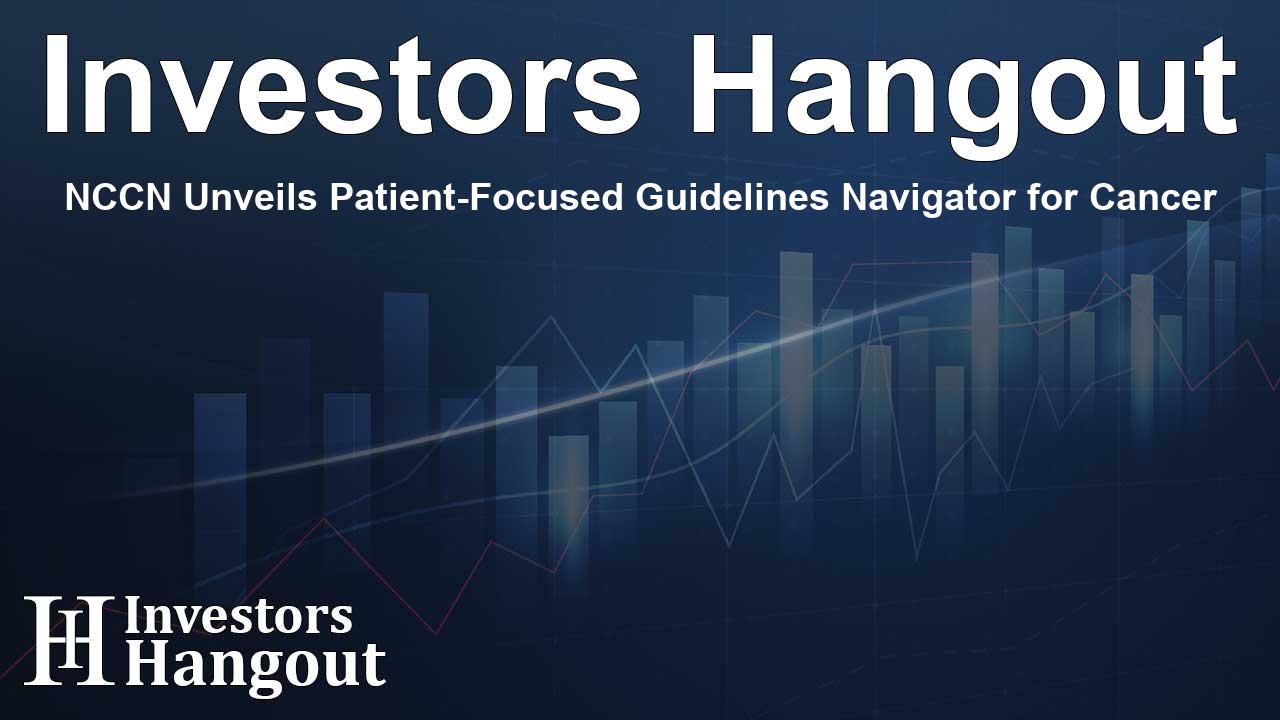NCCN Unveils Patient-Focused Guidelines Navigator for Cancer

NCCN Launches Guidelines Navigator for Enhanced Patient Care
The National Comprehensive Cancer Network has taken a significant step forward in improving cancer care with the launch of the NCCN Guidelines Navigator. This innovative tool is designed to provide healthcare professionals with essential guidance on breast cancer treatment and hereditary risk assessment. The launch coincides with Breast Cancer Awareness Month, highlighting the organization's commitment to supporting those battling cancer.
Empowering Healthcare Providers and Patients
According to Crystal S. Denlinger, MD, the CEO of NCCN, the NCCN Guidelines Navigator enables healthcare providers to swiftly locate and interpret evidence-based treatment options tailored to each patient's unique circumstances. This user-friendly platform aids in making informed treatment decisions, promoting effective care management supported by the latest research and consensus from experts.
Features of the NCCN Guidelines Navigator
The NCCN Guidelines Navigator incorporates a wealth of information from the NCCN Clinical Practice Guidelines in Oncology—recognized as the most frequently updated clinical guidelines in the medical field. Covering topics from prevention and diagnosis to treatment and supportive care, the Navigator is equipped with advanced filtering and search capabilities, allowing users to navigate complex information effortlessly.
The comprehensive library of NCCN Guidelines will soon be accessible in both traditional PDF formats and enhanced digital versions. As of now, the Navigator supports a wide range of cancer types, including:
- B-Cell Lymphomas
- Bladder Cancer
- Breast Cancer
- Colon Cancer
- Genetic/Familial High-Risk Assessment
- Head and Neck Cancers
- Hepatocellular Carcinoma
- Kidney Cancer
- Non-Small Cell Lung Cancer
- Ovarian Cancer
- Prostate Cancer
- Rectal Cancer
- Uterine Neoplasms
Significant Impact on Cancer Care
In the previous year, the NCCN Guidelines were accessed over 16 million times, underscoring the extensive reliance on these resources among healthcare providers. Notably, around 10% of these accesses were for breast cancer treatment guidelines, pointing to the growing need for accessible, high-quality information in a rapidly changing medical landscape where timely data can significantly affect patient outcomes.
Facilitating Professional Development
The NCCN Guidelines Navigator also features seamless integration with NCCN Chemotherapy Order Templates. This integration not only enhances safety and convenience for drug administration but also minimizes the risk of medication errors, ensuring healthcare providers can deliver consistent care while managing potential treatment side effects more effectively.
Future Enhancements in Patient Resources
Alongside its primary functions, the Navigator offers access to the NCCN Guidelines for Patients, which present medical guidelines in an easier format for patients and caregivers. This approach empowers patients by providing clarity in understanding their treatment options and fostering shared decision-making between patients and their healthcare teams.
The NCCN Guidelines Navigator has already seen over 50,000 accesses after initial testing, receiving commendations for its intuitive search functionalities that allow users to find relevant guideline sections quickly. Survey participants have reported favorable experiences, indicating the Navigator's success in making important cancer information more accessible.
About the National Comprehensive Cancer Network
The National Comprehensive Cancer Network is celebrating 30 years as a non-profit alliance of leading cancer centers that emphasizes high-quality patient care, research, and educational initiatives. Through its ongoing commitment to advancing quality cancer care and prevention, NCCN aims to improve the lives of all individuals affected by cancer, empowering both patients and healthcare providers with robust, evidence-based insights to guide treatment options.
Frequently Asked Questions
What is the NCCN Guidelines Navigator?
The NCCN Guidelines Navigator is a digital tool developed to enhance accessible cancer treatment guidance for healthcare providers and patients.
How many cancer types does the NCCN Guidelines Navigator cover?
The Navigator currently supports various cancer types, including breast, ovarian, and prostate cancers, among others.
What are the main features of the NCCN Guidelines Navigator?
It features advanced search capabilities, color-coded navigation, and seamless integration of chemotherapy order templates, enhancing user experience.
How often are the NCCN Guidelines updated?
The NCCN Guidelines are the most frequently updated clinical practice guidelines, ensuring that users have access to the latest research and treatment options.
How can patients benefit from the NCCN Guidelines Navigator?
The Navigator improves patient care by providing easy-to-understand treatment options and promoting meaningful discussions between patients and their healthcare providers.
About The Author
Contact Hannah Lewis privately here. Or send an email with ATTN: Hannah Lewis as the subject to contact@investorshangout.com.
About Investors Hangout
Investors Hangout is a leading online stock forum for financial discussion and learning, offering a wide range of free tools and resources. It draws in traders of all levels, who exchange market knowledge, investigate trading tactics, and keep an eye on industry developments in real time. Featuring financial articles, stock message boards, quotes, charts, company profiles, and live news updates. Through cooperative learning and a wealth of informational resources, it helps users from novices creating their first portfolios to experts honing their techniques. Join Investors Hangout today: https://investorshangout.com/
The content of this article is based on factual, publicly available information and does not represent legal, financial, or investment advice. Investors Hangout does not offer financial advice, and the author is not a licensed financial advisor. Consult a qualified advisor before making any financial or investment decisions based on this article. This article should not be considered advice to purchase, sell, or hold any securities or other investments. If any of the material provided here is inaccurate, please contact us for corrections.
